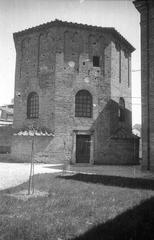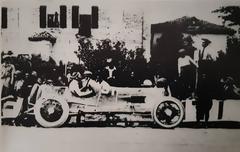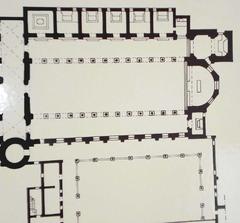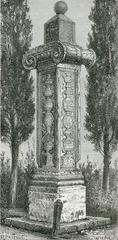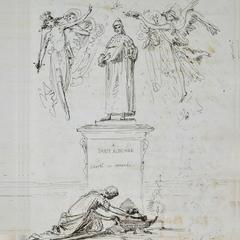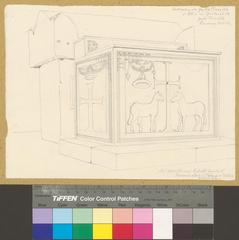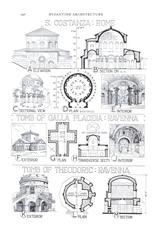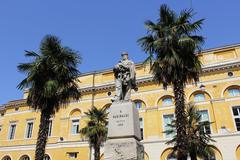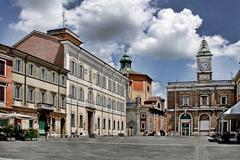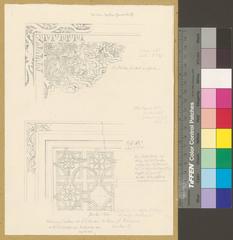Porta Nuova Dei Veneziani Ravenna: Visiting Hours, Tickets, and Travel Guide
Date: 14/06/2025
Introduction
Porta Nuova Dei Veneziani stands as one of Ravenna’s most iconic historical landmarks, offering a fascinating window into the city’s Venetian heritage and Renaissance architectural tradition. Constructed primarily in the late 16th century under Venetian rule, this monumental city gate not only served defensive and commercial functions but also symbolized Ravenna’s political allegiance and urban development during a transformative era (Emilia Romagna Turismo; Italia Off Route). Today, Porta Nuova is a freely accessible open-air monument, located near Ravenna’s UNESCO World Heritage sites and vibrant city center.
This comprehensive guide covers the history, architecture, cultural significance, visiting hours, ticketing information, travel tips, accessibility, and nearby attractions—helping you plan and enrich your visit to this remarkable gateway.
Table of Contents
- Origins and Construction of Porta Nuova Dei Veneziani
- Architectural Features and Style
- Historical and Cultural Significance
- Visiting Information: Hours, Tickets, and Accessibility
- Travel Tips and Suggested Itineraries
- Integration with Ravenna’s City Walls and Urban Context
- Restoration and Preservation Efforts
- Notable Events and Memorials
- Nearby Attractions
- FAQ: Porta Nuova Dei Veneziani
- Visuals and Media Suggestions
- Conclusion and Recommendations
- References
Origins and Construction of Porta Nuova Dei Veneziani
Porta Nuova Dei Veneziani, often referred to simply as Porta Nuova, emerged during the Venetian Republic’s domination of Ravenna (1441–1509). This era saw significant modernization of the city’s defensive structures. The gate replaced the older Porta San Lorenzo, and its construction—spanning from 1580 to 1585—reflected the Venetian commitment to fortifying Ravenna as a strategic Adriatic hub (Emilia Romagna Turismo; Wikipedia: Mura di Ravenna).
Strategically located at the southern boundary, Porta Nuova controlled access from the Adriatic coast and the ancient road to Classe, serving both military and economic purposes. Its very name—“dei Veneziani”—underscores the profound Venetian influence on local architecture and governance (Italia Off Route).
Architectural Features and Style
Porta Nuova is a striking example of Renaissance military architecture infused with Venetian aesthetic sensibilities. Key features include:
- Single Arched Passageway: Framed by two grey granite Corinthian columns supporting a marble trabeation.
- Attic Addition: Added in 1653, constructed of Istrian stone, and decorated with the papal coat of arms of Pope Innocent X, flanked by cornucopias.
- Heraldic Symbols: The attic features a dove with an olive branch and three lilies, symbols of peace and purity.
- Brick and Stone Construction: The predominant use of brick, with accents of Istrian stone—a Venetian hallmark.
- Commemorative Plaques: On the gate’s interior, plaques honor local patriots and commemorate the Italian Liberation (Turismo Ravenna).
Although the original Lion of Saint Mark (Venetian symbol) was removed after 1509, historical records and reliefs document its presence and the gate’s symbolic role during Venetian rule (Italia Off Route).
Historical and Cultural Significance
Porta Nuova is more than an architectural relic. It reflects Ravenna’s layered history as a crossroads of Roman, Byzantine, Ostrogothic, and Venetian influences. The gate regulated commerce, military entry, and ceremonial processions, acting as a customs checkpoint and an emblem of both defense and civic pride (Turismo Ravenna; Facts.net).
During the Venetian era, the gate’s architectural grandeur and heraldic elements reinforced the Republic’s authority. In later centuries, Porta Nuova became a symbol of local resilience and cultural continuity, inspiring artists and writers and serving as a backdrop for significant historical events (Italia Off Route).
Visiting Information: Hours, Tickets, and Accessibility
- Visiting Hours: Porta Nuova is an open-air monument accessible 24/7. There are no restrictions on visiting hours, but daylight visits are recommended for safety and optimal viewing.
- Tickets: No tickets or entrance fees are required—Porta Nuova is completely free to visit (Turismo Ravenna).
- Accessibility: The site is flat and pedestrian-friendly, suitable for visitors with mobility challenges. Some uneven paving may require caution.
- Guided Tours: Many local walking and cycling tours include Porta Nuova among Ravenna’s city gates and fortifications. Check with the Ravenna Experience for specialized options.
- Getting There: Located at the southern end of Via di Roma, Porta Nuova is 500 meters from Ravenna’s main railway station. Paid parking and bike rentals are also available nearby (The Travel Folk; Savoring Italy).
Travel Tips and Suggested Itineraries
- Best Times to Visit: Late spring (May–June) and early autumn (September–October) offer pleasant weather and fewer crowds (The Travel Folk).
- Photography: Early morning and late afternoon light highlight the gate’s architectural details.
- Combine with Other Sights: Include Porta Nuova in a walking tour of Ravenna’s city walls, or as a starting point to visit the MAR – Ravenna Art Museum and nearby UNESCO sites.
- Local Amenities: Cafés, restaurants, and shops are available nearby, particularly along Via di Roma.
Integration with Ravenna’s City Walls and Urban Context
Porta Nuova is an integral part of Ravenna’s historic defensive network, which evolved from ancient Roman walls to Renaissance fortifications. The Venetian enhancements introduced new bastions and artillery-adapted structures, with Porta Nuova providing a key southern gateway (Wikipedia: Mura di Ravenna). Its location linked the city center to the Adriatic coast and the ancient port of Classe.
Restoration and Preservation Efforts
Ongoing conservation ensures Porta Nuova’s structural integrity and historical character. Restoration projects have included masonry cleaning, structural repairs, and preservation of decorative elements. The gate is officially protected, and its surroundings are maintained for pedestrian access (Cityplanet Blog).
Notable Events and Memorials
Today, Porta Nuova is also a site of civic memory. Interior plaques commemorate local patriots and the Italian Liberation, connecting the monument to 20th-century history (Turismo Ravenna). The site hosts community events and serves as a backdrop for art installations and cultural walks.
Nearby Attractions
- MAR – Ravenna Art Museum: A 5-minute walk from Porta Nuova.
- Basilica di Santa Maria in Porto: Close by, with stunning architecture and mosaics.
- Basilica di Sant’Apollinare Nuovo & Mausoleum of Theodoric: UNESCO sites within easy reach.
- Darsena District: Ravenna’s trendy waterfront area, ideal for dining and relaxation.
(Ready Set Italy; Turismo Ravenna)
FAQ: Porta Nuova Dei Veneziani
Q: What are the visiting hours?
A: Porta Nuova is accessible at any time, day or night, all year round.
Q: Is there an admission fee or ticket required?
A: No, the gate is a public monument and free to visit.
Q: How do I get there from the railway station?
A: It’s approximately 500 meters south of Ravenna station, easily walkable.
Q: Are guided tours available?
A: Yes, several walking and cycling tours include Porta Nuova; inquire at the tourist office or local operators.
Q: Is the area accessible for those with mobility challenges?
A: Yes, the area is generally flat and accessible, though watch for uneven historic paving.
Q: Can I take photographs?
A: Yes, Porta Nuova is a popular photography spot, especially during golden hour.
Visuals and Media Suggestions
- Photograph the Gate: Capture its Corinthian columns, marble trabeation, and commemorative plaques.
- Interactive Map: Use an interactive map of Ravenna’s historical sites to plan your visit.
- Virtual Tours: Explore online resources and virtual tours for deeper insight into Ravenna’s architecture.
Conclusion and Recommendations
Porta Nuova Dei Veneziani is a must-see for anyone exploring Ravenna. Its impressive architecture, symbolic heritage, and central location make it an ideal waypoint for discovering the city’s ancient and modern stories. Whether you’re a history enthusiast, architecture lover, or casual traveler, this gateway offers an authentic glimpse into Ravenna’s enduring legacy.
Plan your visit today! Download the Audiala app for curated audio tours, explore our related articles on Ravenna’s city gates, and follow us on social media for up-to-date travel inspiration. Immerse yourself in the rich history and vibrant present of Ravenna through the enduring gateway of Porta Nuova.
References
- Porta Nuova Dei Veneziani: Visiting Hours, Tickets, and Historical Guide to Ravenna’s City Gate, 2025 (Emilia Romagna Turismo)
- Porta Nuova dei Veneziani in Ravenna: Visiting Hours, Tickets, and Historical Significance, 2025 (Italia Off Route)
- Visiting Porta Nuova dei Veneziani: History, Tips, and Ravenna Attractions, 2025 (Wikipedia: Mura di Ravenna)
- Porta Nuova Visiting Hours, Tickets, and Travel Tips for Ravenna’s Historic City Gate, 2025 (Turismo Ravenna)
- Self-Guided Walking Tour of Ravenna with Maps, 2025 (Nomads Travel Guide)
- What to See in Ravenna, Italy, 2025 (Ready Set Italy)
- The Travel Folk
- Savoring Italy
- Cityplanet Blog
- Ravenna Experience
- European Traveler
